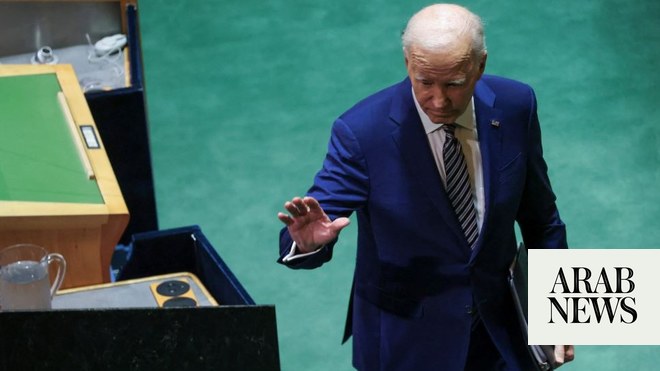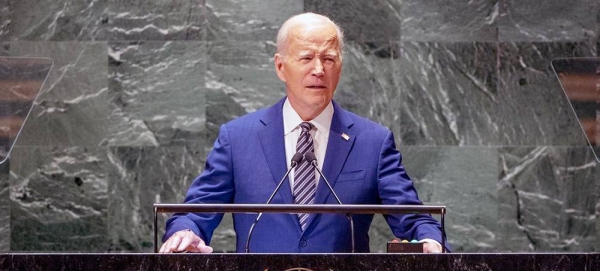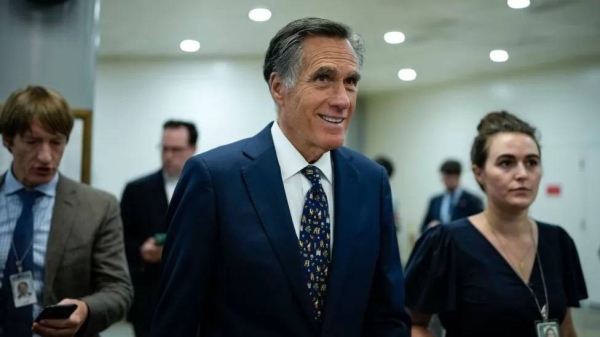
But ‘adversaries can become partners,’ US president tells UN General Assembly
He highlights ‘efforts to build a more sustainable, integrated Middle East’
NEW YORK: The world needs to “stand up” to “naked aggression today, and deter other would-be aggressors tomorrow,” the US president told the UN General Assembly in New York on Tuesday.
In a wide-ranging speech touching upon issues including climate change, health programs, injustice and development, Joe Biden led on the need for proper global engagement on security and diplomacy, and the need for dialogue and peaceful resolutions, saying “adversaries can become partners.”
He told the UNGA: “We know our future is bound to yours, and no nation can meet the challenges of today alone.”
On Russia’s invasion of Ukraine, he said: “For the second year in a row, this gathering, dedicated to the peaceful resolution of conflicts, is darkened by the shadow of war.”
Biden hinted strongly that Russia’s actions would incentivize other states if allowed to continue unchecked.
“We strongly support Ukraine in its efforts to bring about a diplomatic resolution that delivers just and lasting once, but Russia alone bears responsibility for this war. Russia alone has the power to end this war immediately, and it is Russia alone that stands in the way of peace,” he said.
“Russia believes that the world will grow weary and allow it to brutalize Ukraine without consequence, but I ask you this: If we abandon the core principles of the United States to appease an aggressor, can any member state in this body feel confident that they are protected? If we allow Ukraine to be carved up, is the independence of any nation secure? I respectfully suggest that the answer is no.”
But, Biden said, there is plenty of cause for hope that through dialogue, peace and progress is possible.
“About a week ago, I stood on the other side of the world, in Vietnam, on soil once bloody with war,” he said.
“For decades, it would’ve been unthinkable for an American president to stand in Hanoi alongside the Vietnamese leader and announce a mutual commitment to the highest level of country partnership. But it’s a powerful reminder that our history need not dictate our future.”
Biden also touched upon US relations with China and Iran, and its role in the Middle East and North Africa, saying how the Universal Declaration of Human Rights, drafted by people of “different regions, faiths, philosophies,” had remained “ever steady and ever true.”
He added: “We cannot turn away from abuses, whether in Xinjiang, Tehran, Darfur, or anywhere else.”
On the issue of human rights, Biden also touched upon the “enormous potential and enormous peril” posed by new technology, including artificial intelligence, adding that the US is working with its partners to strengthen global rules and systems to “make sure” AI is not used as a tool of “oppression.”
He said cooperation is having a meaningful impact worldwide, singling out the Middle East in particular, noting how diplomacy had helped forge a new economic partnership to connect “India to Europe through the UAE, Saudi Arabia, Jordan and Israel.”
He said: “This will spur opportunities for investment across two continents. This is part of our efforts to build a more sustainable, integrated Middle East.
“It demonstrates how Israel’s greater normalization and economic connection with its neighbors is delivering positive and practical impacts even as we continue to work tirelessly to support a just and lasting peace between the Israelis and Palestinians.”
Biden insisted that Washington would stand opposed to Tehran’s “destabilizing” attempts to develop a nuclear weapons program, saying: “Iran must never acquire a nuclear weapon.”
On China, he offered a firm but conciliatory message. “When it comes to China, I want to be clear and consistent: We seek to responsibly manage the competition between our countries so it doesn’t tip into conflict,” he said.
“We stand ready to work together with China on issues where progress hinges on our common efforts. Nowhere is that more critical than the accelerating climate crisis.”
Climate change was high on Biden’s list of issues to address, and he highlighted the devastating flooding in Libya this month as a warning to the world of what faces humanity.
“Tragic, tragic flooding in Libya — my heart goes out to the people of Libya — that’s killed thousands, thousands of people,” he said.
“These snapshots tell an urgent story of what awaits us if we fail to reduce our dependence on fossil fuels.”
But Biden’s overall outlook on the world’s ability to make change remained upbeat. “We lifted more than a billion people out of extreme poverty. We, together, expanded access to education for millions of children. We saved tens of millions of lives that would otherwise have been lost to preventable and treatable diseases,” he said.
“Working together, the world made some remarkable and undeniable progress,” he added, backing several reforms to global institutions including the World Trade Organization, the UN Security Council and the International Monetary Fund, and highlighting efforts to “reform and scale up the World Bank” in a bid to address inequality and climate change.












